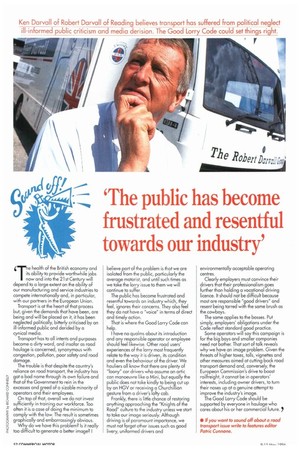'The public has become frustrated and resentful towards our industry'
Page 54

If you've noticed an error in this article please click here to report it so we can fix it.
Ken DaryaII of Robert DaryaII of Reading believes transport has suffered from political neglect ill-informed public criticism and media derision. The Good Lorry Code could set things right.
Ce health of the British economy and
Th its ability to provide worthwhile jobs now and intro the 21 st Century will depend to a large extent on the ability of our manufacturing and service industries to compete internationally and, in particular, with our partners in the European Union. Transport is at the heart of that process but, given the demands that have been, are being and will be placed on it, it has been neglected politically, bitterly criticised by an ill-informed public and derided by a cynical media. Transport has to all intents and purposes become a dirty word, and insofar as road haulage is concerned, synonymous with congestion, pollution, poor safety and road damage. The trouble is that despite the country's reliance on road transport, the industry has gala bad name through its own failure and that of the Government to rein in the excesses and greed of a sizable minority of operators and their employees. On top of that, overall we do not invest sufficiently in training our workforce. Too often it is a case of doing the minimum to comply with the law. The result is sometimes graphically and embarrassingly obvious. Why do we have this problem? 15 it really too difficult to generate a better image? I believe port of the problem is that we are isolated from the public, particularly the average motorist, and until such times as we take the lorry issue to them we will continue to suffer.
The public has become frustrated and resentful towards an industry which, they feel, ignores their concerns. They also feel they do not have a "voice' in terms of direct and timely action. That is where the Good Lorry Code can help. 1 have no qualms about its introduction and any responsible operator or employee should feel likewise. Other road users' experiences of the lorry most frequently relate to the way it is driven, its condition and even the behaviour of the driver. We hauliers all know that there are plenty of "loony" car drivers who assume an artic can manoeuvre like a Mini, but equally the public does not take kindly to being cut up by an HGV or receiving a Churchillian gesture from a driver's lofty cab. Frankly, there is little chance of restoring anything approaching the "Knights of the Road" culture to the industry unless we start to take our image seriously. Although driving is of paramount importance, we must not forget other issues such as good livery, uniformed drivers and environmentally acceptable operating centres.
Clearly employers must convince their drivers that their professionalism goes further than holding a vocational driving licence. It should not be difficult because most are responsible "good drivers" and resent being tarred with the same brush as the cowboys. The same applies to the bosses. Put simply, employers' obligations under the Code reflect standard good practice. Some operators will say this campaign is for the big boys and smaller companies need not bother. That sort of talk reveals why we have an image problem. Given the threats of higher taxes, tolls, vignettes and other measures aimed at cutting back road transport demand and, conversely, the European Commission's drive to boost railfreight, it cannot be in operators' interests, including owner drivers, to turn their noses up at a genuine attempt to improve the industry's image. The Good Lorry Code should be supported by everyone in haulage who cares about his or her commercial future., • If you want to sound off about a road transport issue write to features editor Patric Cunnane.
















































































































